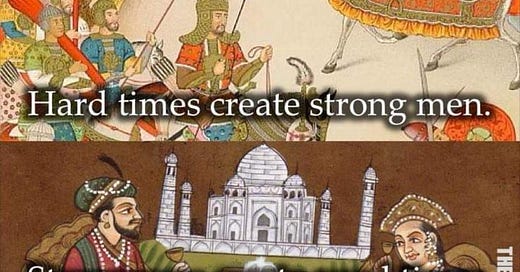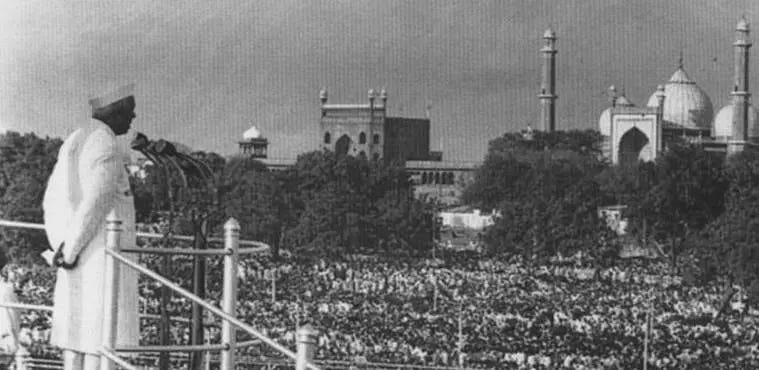History is written by the victors; it is a record of the winning side’s deed on Earth. Less generously, it is a good ol’ times tale. But if history is just stories, can we learn anything from it? Can we learn something about society by finding patterns in those stories?
Politicians and generals, scientists, artists, messiahs and merchants by their action or negligence change the tenor or mood of society. Society and its constituent sections react to events with alarm or calm, with protest or celebrations depending on how secure their position feels.
Weeks When Decades Happen
There are some decades in which political debate seems to be stuck on the issues of our grandfather’s time. Politicians as poets wax lyrically about ideals without any solid change on the ground. War is distant and political stakes seem trivial and impersonal. Society yearns for change; the mood of society seems indifferent and exhausted. There are decades when nothing happens.
And some decades in which change seems so accelerated that society itself feels threatened by it. Leaders bark brickbats and act on consequential agendas with deep personal impact. Many old issues are resolved decisively, without compromise and a new excitement emerges in the body politic. There are weeks when decades happen.
More light heartedly, there are some decades whose cultural output is original, technically complex and new; these decades are remembered fondly, and their movies and songs are “evergreen”. And then there are decades when all that culture churns out is remix and simple repeating music.
Strong Men Create Good Times
These observations might seem modern in formulation, but through ages and geographies, a thread seems to bind these stories together. History does not advance linearly like a calm river where each decade flows like the last. There is a secret rhythm to history.
Over the millennia, many scholars of different civilizations and of wildly different world views have stumbled upon this secret rhythm to history. In the Hindu civilization time is divided cyclically into four yugas or ages. The Chinese have Mandate of Heaven which comes and goes periodically. But the Arab historian/scholar Ibn Khaldun put it best:
Strong Men create Good Times,
Good Times create Weak Men.
Weak Men create Bad Times,
Bad Times create Strong Men.
Periods of empire building are preceded by golden ages. Golden ages breeds decadence and arrogance. Arrogance leads to overreach, unending wars and economic turmoil. If not resolved this leads to collapse and dark ages.
Are we condemed to repeat it?
But the question remains why does history move in this cycle? The most convincing explanation of the cyclic nature of history is given by American economist and demographer Neil Howe with Generational Theory of History. According to Neil Howe and his late partner William Strauss, the driving force of history is generational aging.
Take the example of society that has gone through a bloody total war which has touched the life of every family in it, either through change in material circumstances or loss of young men in fighting. This generation ages and starts to occupy positions of power. Having seen war at close quarters they take diplomacy and compromise seriously. A new generation grows up in peace. As the elder generation passes away and is replaced by this generation, compromises of the past seem corrupt and unjust. The old rationales are forgotten. In unmaking them, they lead society to war and the cycle repeats.
Hence the driving force of history is essentially generation forgetting. Men forget history and are condemned to repeat it.
4 scores and 7 years ago…
But the theory goes further than just providing a driving force of the generation cycle. It also gives a bound to the length of a cycle. The claim here is that a historical cycle (called “saeculum” by Mr. Howe) lasts between 80-100 years, the length of a long human lifespan.
This corresponds surprisingly well with other scholars, like the 80-year Konderite wave in economics and Toynbee’s 80-year war cycle. Just like the length of the human heartbeat, the duration of each saeculum is not fixed, but is approximately the same.
Being American Mr. Howe gives the example of Gettysburg address where Abraham Lincon invigorates union solders with the memory of “4 scores and 7 years ago...”, i.e. 87 years have passed since George Washington lead American colonies to victory against the British. Exactly 80 years later, another American General Douglas MacArthur leads America to victory at Iwo Jima concluding WWII. [1776, 1865, 1945]
Tryst with Destiny
What about Indian history? The historically keen among us are already tingling with excitement. Taking the Indian rebellion of 1857 as the mid-point, the rebels fighting must have had in mind to avenge the defeat they suffered at Plassey exactly 100 years ago. Consider this tryst with destiny. A child born in Chandni Chown as the British smashed the Red Fort in 1857, would have, just, in 1947, stood at it’s footsteps as we redeemed our pledge of Independence. (Think Gourmohan 'Gora’ Bhattacharya in Rabindranath Tagore’s novel Gora). When we read accounts from 25 August 1947, a feeling of a new age dawning is palpable.
We can go back even further, to Aurangzeb defeating Dara Shikho, Shah Jahan’s favoured successor, in 1658 at Battle of Samugarh ending policy of religious tolerance in India and forever changing the course of Indian history. Accounts from the time remark at the brutality metted out to his relatives. The oldest people alive then would have just about witnessed the the accession of Akbar in 1556, one lifetime ago. Lamenting at this reversal, they would have recognized the setting of the Mughal Golden Age.
Saeculum — Timeline in Indian History
In the style of Howe-Strauss Generational Theory these will be saecula of Indian History:
Independence Saeculum
1947 - ongoing??
British Raj
1857 - 1947
Company Rule or The Century of Anarchy
1757 - 1857
(Name to be decided)
1658 - 1757
Mughal Golden Age
1556 - 1658
Please note the year markers are tentative. To the extent that saeculum might be hiding in somewhere. Also keep in mind that this is narrative or popular history, it is ultimately filtered from the point of view of victors and subsequent revision by powers that be. I am not an academic historian.
In subsequent posts we will take a closer look at the rhythms within a saeculum, the establishment, the rise, glory and degeneracy, and the fall in each of the cycles listed above. We will also look at Howe-Strauss theory more closely and explore archetypes or moods of society. In future, we may also take a detour and relate the writing of fiction and good narrative structure to the writing of history.
Until next time !





